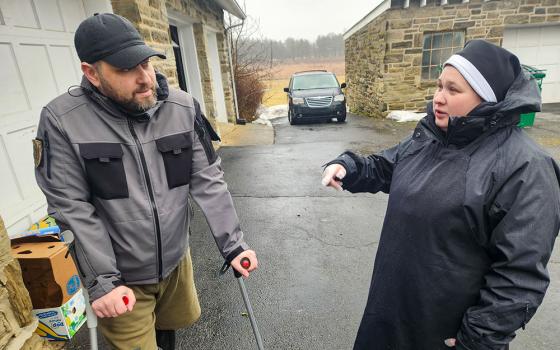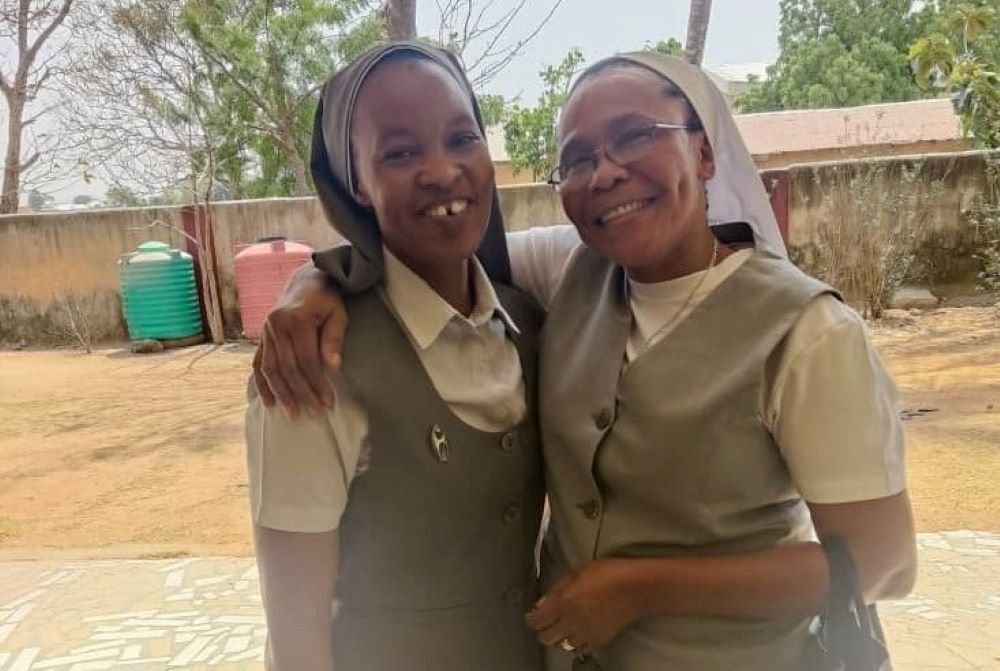
Medical Missionaries of Mary Srs. Florence Njoku (left) and Nancy Ong'era stand together a few days before they traveled to Nigeria's general elections, which were held on Feb. 25. Before the bandits came, the sisters ran a hospital in Munya, a local, government-administered community near Niger, Nigeria. Now they run a mini clinic with limited services. (Courtesy of Medical Missionaries of Mary)
Before the bandits came, sisters of the Medical Missionaries of Mary once ran a hospital in Munya, a local, government-administered community about 25 kilometers from the capital city of Niger, north central Nigeria.
"Our focus is health and holistic healing for people from marginalized communities or areas with greater health needs," Sr. Florence Njoku said. "We promote health and well-being and we want to empower people to take more responsibility for their health."
Njoku said in living up to the calling of their charism, the community complements the work of the church in the area of healing.
The religious community has been in the area since the 1980s, covering 16 villages and offering basic primary health care services such as consultation, treatment and prevention.
The sisters, who are mostly trained nurses and doctors, also offer health education and basic water, sanitation and hygiene programs.
"We try to educate the patients on what the problem is because when a patient knows their health problem, they will be able to protect themselves," she said. "We teach them lifestyle changes, nutrition, family planning, medication, personal hygiene, and how to protect water sources to help them make informed decisions."
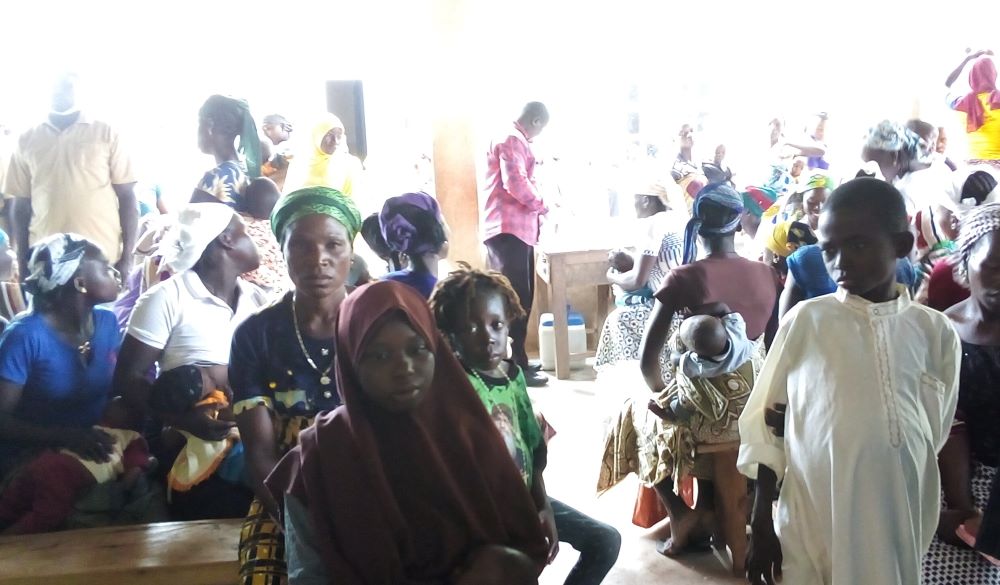
Women and children participate in a clinic outreach program organized by the sisters (Courtesy of Medical Missionaries of Mary)
The hospital was open to the public from 8 a.m. to 6 p.m. Monday through Friday, and saw 80 to 100 people each day. On immunization days, more than 100 children attended.
"It's usually a busy day here and the patient's turnout goes beyond Niger state to neighboring states," Njoku said.
Armed militia disrupts health services
Niger is one of the seven Nigerian states affected by the violent activities of heavily armed bandits and local gangs who attack villages, destroy farmlands and abduct for ransom.
In the last few years, the religious community has found itself entangled in a web of violent attacks by bandits. They have been living in fear and danger, unsure of what happens next.
Barely a week after Njoku arrived in the community in April 2021, the bandits struck, attacking the sleepy town where the sisters live.
"That was our first experience with bandits," she said.
Njoku and other sisters in the community closed the hospital and fled the town to seek refuge in safer areas. Three months later, they returned despite increasing security concerns. They reopened the hospital and started offering health services to residents of the town.
In February 2022, attacks started again. The sisters once more fled for their safety and returned a week later. Later in March, they fled the community and have not returned.
"People from the larger community were attacked and kidnapped for ransom," Njoku said. "Our domestic staff was one of those who was abducted but she was later released."
Niger remains a safe haven for the bandits who abduct villagers and kill security personnel. Since the beginning of this year, dozens of locals have been killed by the bandits while more than 100 others have been abducted.
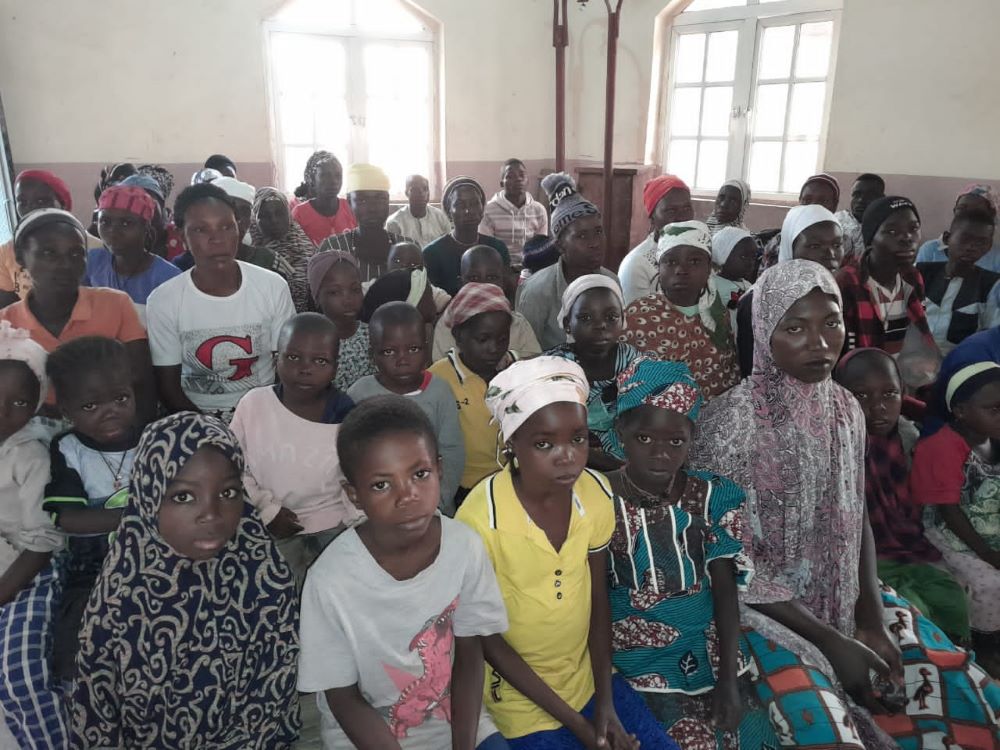
Children participate in a clinic outreach program for sickle cell anemia in rural communities. Sickle cell anemia and tuberculosis are common diseases in the area. (Courtesy of Medical Missionaries of Mary)
This June alone, about 40 villagers were killed by the bandits. In March, the bandits killed 11 people in Munya, the area where the sisters live. Hundreds of residents of the community were displaced during the recent attacks.
According to the Council on Foreign Relations' Nigeria Security Tracker, 17,283 have been killed by armed militants in the country between 2011 and 2020. The Nigeria Security Tracker is a project of the Council on Foreign Relations' Africa program, which documents and maps violence in Nigeria that is motivated by political, economic or social grievances.
Since the sisters left Munya, the bandits visited their empty community.
"People's homes were destroyed and so, we decided it was no longer safe for us to continue staying there," she said. "It has already been one year since we closed our clinic and convent due to attacks."
Launching a mini clinic
After fleeing their community and shutting down the hospital, the sisters started brainstorming on how to start another clinic to provide health services to residents.
Njoku said they made several consultations and worked with their local diocese, deanery, bishops and community members to find a way to reach out to people who need care.
"We asked ourselves how else can we cater for the people outside of the hospital because we are aware that people are suffering after we shut down," she said. "It was a difficult decision for the community and the sisters."
The sisters said they decided to focus on the important aspect of care that people needed the most.
"We know that sickle cell anemia and tuberculosis are two of the health issues facing people in the area," said Njoku, who is a nurse practitioner.
The area has one of the highest number of cases of tuberculosis in Nigeria and the hospital run by the sisters is one of the best treatment centers for the disease. Government hospitals sometimes rely on their facilities to collect relevant data on the disease.
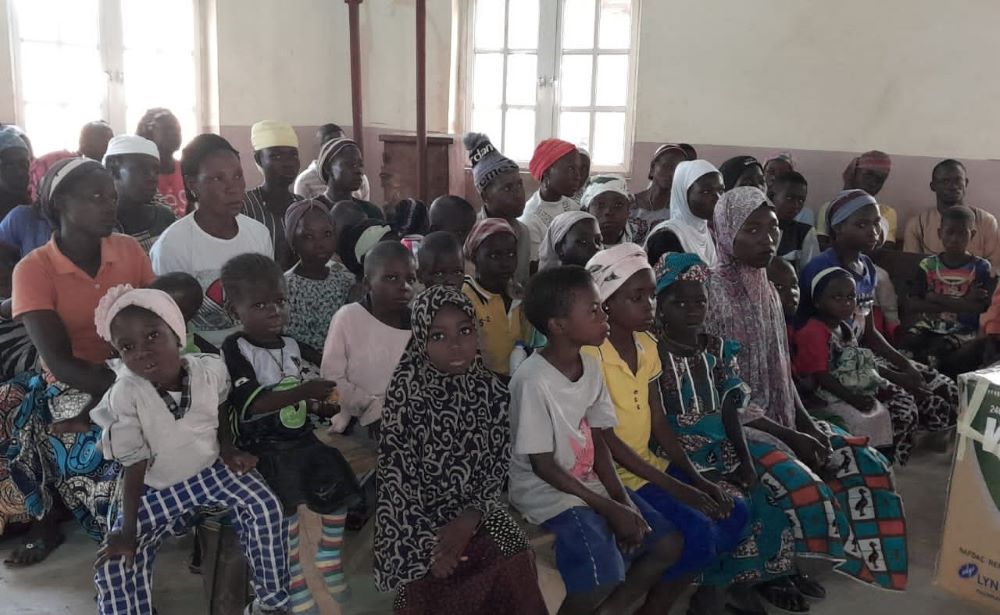
The sisters of Medical Missionaries of Mary organize immunization programs for children in rural communities. (Courtesy of Medical Missionaries of Mary)
In Nigeria, hospitals run by missionaries are mostly better equipped than government-run clinics. People seeking treatment for medical emergencies usually patronize mission hospitals.
The sisters decided to open a mini designated outreach clinic that will serve as a central location for people around the area who need basic health treatment, especially those who fled their communities because of attacks by the gunmen.
To make the new hospital work, the sisters went back to their hospital to get the essential equipment and supplies. Njoku told GSR that they took lab equipment, generators, reagents, tables and computers.
From Monday to Thursday each week, the new clinic runs limited services, unlike the one they left behind in Munya. Fridays are reserved for restocking supplies.
Before they fled Munya, the hospital had 26 staff who assisted the sisters. Some of the staff have relocated and moved on to other jobs due to limited services.
The number of patients has also dropped significantly because many people were displaced as a result of the attacks. The hospital sees 40-60 visitors in a day compared to the previous number of more than 100 a day.
Njoku said people have been asking for an increase in the clinic's capacity and health services such as immunization for childhood preventable diseases.
"In our former place, we had a full hospital and offered a range of services which we are not offering now because we don't have the space and equipment like before," Njoku said.
'We want to go back'
Njoku said the sisters look forward to returning to their community.
"It is our home," she said. "It's just like someone moving to a friend's house; within yourself, you know it is not your home. You would like to go back home where you feel comfortable."
She added: "I long to go back to my community because there are a lot of things we have missed. We have missed the comfort of our community, the space and people around."
Njoku said even though they communicate with residents of the community over the phone, it's not the same as seeing each other in person.
"We will go back when the place is safe for us and I'm looking forward to it," she said.
Sr. Nancy Ong'era, who lived with Njoku before they fled the community, said living in an unfamiliar environment is a challenge, adding that they are trying to adjust the best way they could.
"We are safe where we are and we are able to reach out to people and do minor work," she said.
Advertisement
The sisters said they have a unique way of dealing with trauma since the attacks. Most evenings, they come together to talk about it and share information and tips about what is happening around them.
"We find courage in each other's story and also support each other the best way we can," Njoku said during a phone interview. "If anybody needs professional care, we encourage them to seek some."
Njoku added that the resilience shown by the residents of the community has kept them going.
"When you look at families with little children and how they bounced back from attacks, that gives you the courage to carry on," she said. "They run after attacks and return the next day because that is the only home they have. They have nowhere else to go. So, you have to develop your own resilience to deal with trauma."
Njoku told GSR that even though she wants to go back, she is still concerned.
"There is no place that is safe in Nigeria," she said. "There is still a feeling of insecurity everywhere and you become vulnerable in such places."




